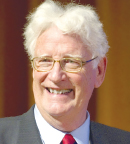
Serendipity plays a major role in biological progress. That’s why I tell people who are starting in the game to keep at least three or four different lines of investigation going, because the one that pays off is the one you don’t think will.— Peter Nowell, MD
Tweet this quote
Peter Nowell, MD, was a pathologist at the University of Pennsylvania studying leukemia cells under a microscope when he happened to wash his slides with tap water instead of laboratory solution. Viewing the newly cleaned slides under a microscope, he saw that the water had caused the cell’s chromosomes to expand as separate structures. “I didn’t know anything about chromosomes,” he told The Philadelphia Inquirer years later, “but it seemed a shame to throw this away.”
Dr. Nowell searched for an expert on chromosomes in the area to work with and found David A. Hunger, of Fox Chase Cancer Center (then the Institute for Cancer Research). The seminal observation was made that certain leukemia cells had an abnormally short chromosome 22. In 1959, that mutation was described as the Philadelphia chromosome. Dr. Nowell and his codiscoverer had opened a heretofore-closed window, showing the first clear sign of a genetic cause of cancer. Dr. Nowell died on December 26, 2016, in Newtown Square, Pennsylvania. He was 88.
Cancer Center’s First Director
Dr. Nowell was born in Philadelphia on February 8, 1928, into a middle-class family. His mother was a teacher and his father was an electrical engineer for the Bell Telephone Company. He went to Wesleyan University in Middletown, Connecticut, receiving a bachelor’s degree in biology and chemistry in 1948 and a medical degree from the University of Pennsylvania in 1952. That same year, Dr. Nowell married Helen Walker Worst, and they had five children.
Dr. Nowell spent 2 years in the Navy during the Korean War studying radiation and bone marrow transplantation, after which he joined the University of Pennsylvania faculty in 1956. From 1967 to 1973, Dr. Nowell served as chair of the university’s pathology department and as its cancer center’s first director, now known as the Abramson Cancer Center at the University of Pennsylvania. He spent the rest of his career at the University of Pennsylvania. At the time of his death, he was the Gaylord P. and Mary Louise Harnell Emeritus Professor of Pathology and Laboratory Medicine at the University of Pennsylvania.
Breakthrough Scientific Work
Dr. Nowell once reflected on the accidental nature of his discovery during an interview with the Lasker Foundation: “Serendipity plays a major role in biological progress. That’s why I tell people who are starting in the game to keep at least three or four different lines of investigation going, because the one that pays off is the one you don’t think will. As my old chief used to say, the real trick is to keep going out on different limbs and then decide how far out to go before you go back to the trunk of the tree, which is the main area you’re interested in.”
Dr. Nowell’s breakthrough scientific work produced monumental steps in the treatment of cancers. In 1998, Dr. Nowell, along with geneticists Drs. Janet D. Rowley and Alfred G. Knudson, Jr, received the Albert Lasker Clinical Medical Research Award. He was also elected to the National Academy of Sciences and the American Academy of Arts and Sciences. Upon the 50th anniversary of the Philadelphia chromosome discovery, the Franklin Institute awarded Dr. Nowell its Benjamin Franklin Medal in Life Science. In 2013, he was awarded the Albany Medical Center Prize in Medicine and Biomedical Research, and in 2014, he was elected Fellow of the American Association for Cancer Research. He also coauthored more than 400 publications.
Colleagues Remember
His department colleagues posted a recollection of Dr. Nowell: “Peter is remembered in the Department as a dear friend, an outstanding role model for faculty and students alike, a wonderful colleague, and a truly exceptional gentleman and scholar. He cared deeply for his family and for his colleagues. As a cherished mentor, Peter embodied the model where ‘standing on the shoulders of giants’ has led to great discoveries and saved many lives.” ■

